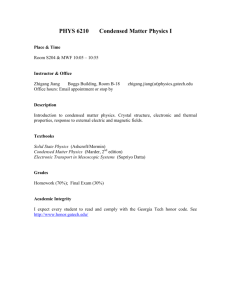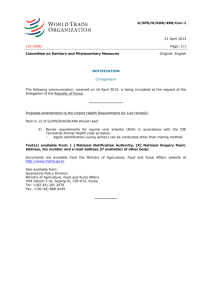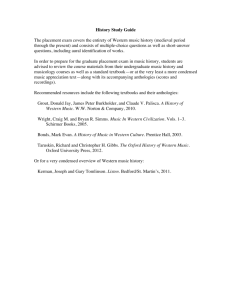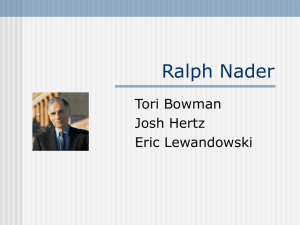� � Summer in the Canary Islands
advertisement
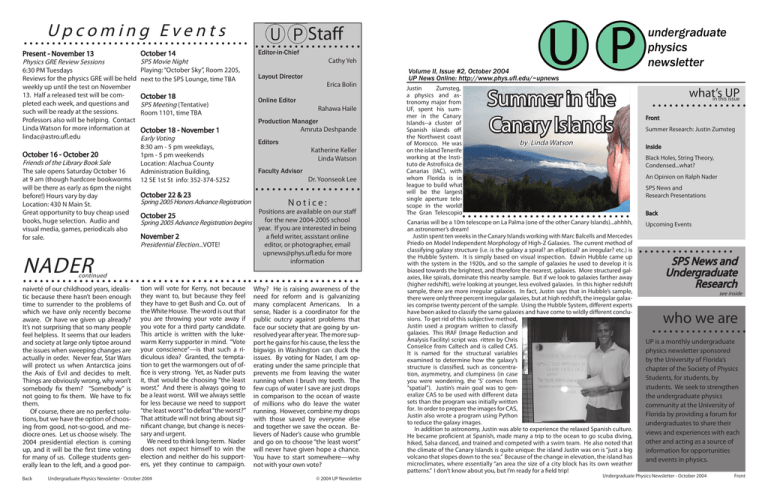
Upcoming Events Present - November 13 Physics GRE Review Sessions 6:30 PM Tuesdays Reviews for the physics GRE will be held weekly up until the test on November 13. Half a released test will be completed each week, and questions and such will be ready at the sessions. Professors also will be helping. Contact Linda Watson for more information at lindac@astro.ufl.edu October 16 - October 20 Friends of the Library Book Sale The sale opens Saturday October 16 at 9 am (though hardcore bookworms will be there as early as 6pm the night before!) Hours vary by day Location: 430 N Main St. Great opportunity to buy cheap used books, huge selection. Audio and visual media, games, periodicals also for sale. NADER October 14 Editor-in-Chief SPS Movie Night Playing: “October Sky”, Room 2205, next to the SPS Lounge, time TBA Layout Director October 18 SPS Meeting (Tentative) Room 1101, time TBA October 18 - November 1 Early Voting 8:30 am - 5 pm weekdays, 1pm - 5 pm weekends Location: Alachua County Administration Building, 12 SE 1st St info: 352-374-5252 October 22 & 23 Spring 2005 Honors Advance Registration Cathy Yeh Erica Bolin Online Editor Rahawa Haile Production Manager Amruta Deshpande Editors Katherine Keller Linda Watson Faculty Advisor Dr. Yoonseok Lee Notice: Positions are available on our staff for the new 2004-2005 school Spring 2005 Advance Registration begins year. If you are interested in being a field writer, assistant online November 2 editor, or photographer, email Presidential Election...VOTE! upnews@phys.ufl.edu for more information October 25 continued naiveté of our childhood years, idealistic because there hasn’t been enough time to surrender to the problems of which we have only recently become aware. Or have we given up already? It’s not surprising that so many people feel helpless. It seems that our leaders and society at large only tiptoe around the issues when sweeping changes are actually in order. Never fear, Star Wars will protect us when Antarctica joins the Axis of Evil and decides to melt. Things are obviously wrong, why won’t somebody fix them? “Somebody” is not going to fix them. We have to fix them. Of course, there are no perfect solutions, but we have the option of choosing from good, not-so-good, and mediocre ones. Let us choose wisely. The 2004 presidential election is coming up, and it will be the first time voting for many of us. College students generally lean to the left, and a good porBack tion will vote for Kerry, not because they want to, but because they feel they have to get Bush and Co. out of the White House. The word is out that you are throwing your vote away if you vote for a third party candidate. This article is written with the lukewarm Kerry supporter in mind. “Vote your conscience”—is that such a ridiculous idea? Granted, the temptation to get the warmongers out of office is very strong. Yet, as Nader puts it, that would be choosing “the least worst.” And there is always going to be a least worst. Will we always settle for less because we need to support “the least worst” to defeat “the worst?” That attitude will not bring about significant change, but change is necessary and urgent. We need to think long-term. Nader does not expect himself to win the election and neither do his supporters, yet they continue to campaign. Undergraduate Physics Newsletter - October 2004 � � Staff Why? He is raising awareness of the need for reform and is galvanizing many complacent Americans. In a sense, Nader is a coordinator for the public outcry against problems that face our society that are going by unresolved year after year. The more support he gains for his cause, the less the bigwigs in Washington can duck the issues. By voting for Nader, I am operating under the same principle that prevents me from leaving the water running when I brush my teeth. The few cups of water I save are just drops in comparison to the ocean of waste of millions who do leave the water running. However, combine my drops with those saved by everyone else and together we save the ocean. Believers of Nader’s cause who grumble and go on to choose “the least worst” will never have given hope a chance. You have to start somewhere—why not with your own vote? © 2004 UP Newsletter Volume II, Issue #2, October 2004 UP News Online: http://www.phys.ufl.edu/~upnews Justin Zumsteg, a physics and astronomy major from UF, spent his summer in the Canary Islands--a cluster of Spanish islands off the Northwest coast of Morocco. He was on the island Tenerife working at the Instituto de Astrofisica de Canarias (IAC), with whom Florida is in league to build what will be the largest single aperture telescope in the world! The Gran Telescopio Summer in the Canary Islands by Linda Watson undergraduate physics newsletter what’s UP in this issue Front Summer Research: Justin Zumsteg Inside Black Holes, String Theory, Condensed...what? An Opinion on Ralph Nader SPS News and Research Presentations Back Canarias will be a 10m telescope on La Palma (one of the other Canary Islands)...ahhhh, an astronomer’s dream! Justin spent ten weeks in the Canary Islands working with Marc Balcells and Mercedes Priedo on Model Independent Morphology of High-Z Galaxies. The current method of classifying galaxy structure (i.e. is the galaxy a spiral? an elliptical? an irregular? etc.) is the Hubble System. It is simply based on visual inspection. Edwin Hubble came up with the system in the 1920s, and so the sample of galaxies he used to develop it is biased towards the brightest, and therefore the nearest, galaxies. More structured galaxies, like spirals, dominate this nearby sample. But if we look to galaxies farther away (higher redshift), we’re looking at younger, less evolved galaxies. In this higher redshift sample, there are more irregular galaxies. In fact, Justin says that in Hubble’s sample, there were only three percent irregular galaxies, but at high redshift, the irregular galaxies comprise twenty percent of the sample. Using the Hubble System, different experts have been asked to classify the same galaxies and have come to wildly different conclusions. To get rid of this subjective method, Justin used a program written to classify galaxies. This IRAF (Image Reduction and Analysis Facility) script was ritten by Chris Conselice from Caltech and is called CAS. It is named for the structural variables examined to determine how the galaxy’s structure is classified, such as concentration, asymmetry, and clumpiness (in case you were wondering, the ‘S’ comes from “spatial”). Justin’s main goal was to generalize CAS to be used with different data sets than the program was initially written for. In order to prepare the images for CAS, Justin also wrote a program using Python to reduce the galaxy images. In addition to astronomy, Justin was able to experience the relaxed Spanish culture. He became proficient at Spanish, made many a trip to the ocean to go scuba diving, hiked, Salsa danced, and trained and competed with a swim team. He also noted that the climate of the Canary Islands is quite unique: the island Justin was on is “just a big volcano that slopes down to the sea.” Because of the change in elevation, the island has microclimates, where essentially “an area the size of a city block has its own weather patterns.” I don’t know about you, but I’m ready for a field trip! Upcoming Events SPS News and Undergraduate Research see inside who we are UP is a monthly undergraduate physics newsletter sponsored by the University of Florida’s chapter of the Society of Physics Students, for students, by students. We seek to strengthen the undergraduate physics community at the University of Florida by providing a forum for undergraduates to share their views and experiences with each other and acting as a source of information for opportunities and events in physics. Undergraduate Physics Newsletter - October 2004 Front String Theory, Black Holes, Condensed by...Mike What? Swick Unlike most other physics majors, I studied absolutely nothing this summer. I did not learn about gravitational waves, non-linear optics, or quantum theory. “Why?” you might ask--well that stuff sounds really hard. I mean come on, I have read a number of popular science books and not one of them mentioned condensed matter. Don’t believe me? Pick up anything by Hawking, or check out the New York Times Bestseller, The Elegant Universe. These are perhaps the most famous science books out there that are accessible to the general public. While String Theory also sounds difficult, it is exotic, strange, and opens a whole new world of possibilities to out of work science fiction writers. The point is that these books do not paint a highly realistic picture of what is going on in the physics community today. Just looking at the UF faculty web listing, I see 19 people listed in condensed matter, even listed in low temperature, seven in the QTP, four in nuclear physics, and Dr. Hagen as the sole Biophysicist here (shout out to my biologically inclined friend!). There are thirteen people in High Energy Physics, but I don’t think many of them are currently focusing on string theory. The common conception of physics today is that most scientists are working on either black holes, string theory, flying cars, teleportation or whatever is currently being featured on the cover of Popular Science magazine. Condensed matter physics probably gets the short end of the stick the most. When I say to an educated fellow collegian anything about condensed matter, I am immediately questioned with “What’s that, and why isn’t it about wormholes?” Still, CMP is the most populous group here at UF Physics. So, how can the CMP guys get in with the cool crowd? Easy, rename your field to something exotic. Sure, you can still call it condensed matter amongst yourselves, but maybe spice things up with a name change. I tried putting condensed matter into the thesaurus to see what I got. Here is a list of acceptable alternatives: Hard stuff, compact constituents, and my personal favorite--epitomized corporeality. That’s it! Henceforth, condensed matter research shall now be known as epitomized corporeality. Now that is exotic sounding. But I still think there is more to be done to fix the over-glamorized image of physics. People need to learn that the life of a physicist isn’t all hobnobbing with Nobel Laureates, bossing grad students around, and parties at the Playboy mansion that it used to be (thanks Feynman!) Well, the bossing of grad students might still be true, and I could have sworn I overheard some of the QTP guys talking about Hef’s cigar collection, but that’s beside the point. It is up to you, faithful undergrad, to make the difference. Tell your friends about the physics you are doing. Let them know that what you are studying is typical of physics research, but not of the public opinion. And most importantly, when you see someone write an article on how string theory is the new wave, smack them on the knuckles and substitute condensed matter for string theory. Better yet, put in epitomized corporeality. First Impressions of Ralph Nader by Cathy Yeh A blatantly un-objective viewpoint Note: The views expressed below are not necessarily those of UP Newsletter, the Society of Physics Students, or the UF Physics Department. Read at your own discretion. “You’ve been really quiet—are you alright?” my friend asked as I got up slowly from my seat in the Curtis Phillips Center for the Performing Arts. My head was swimming with information from the past few hours. It was Friday October 1st, and presidential candidate Ralph Nader had just finished speaking. It was refreshing to hear someone speak so knowledgeably about other, dare I say more important, issues after the time the other candidates had spent pounding, drilling, boring, hammering, beating, and clobbering homeland security into my head. I am not writing to inform you about the content of Nader’s platform. Go to www.votenader.org to find out firstInside hand yourself. I am writing to encourage you to at least learn something about him before you instantly write him off, as I had done before in my ignorance. In fact, go find out about all the presidential candidates if you have not already. Homework can wait. Wonderful fellows that Maxwell, Einstein, and all the other guys are, they will not help your social security or clean up your air. Leaving the rally, I felt Nader covered all the bases. His ideas for reform were well supported, as were his criticisms of the other candidates’ platforms and parties. He obviously had a wide and deep knowledge of the world, and his speech appealed to the intelligence of his listeners. Here was someone who Undergraduate Physics Newsletter - October 2004 dealt in action, not just words. Take a look at his public service record. Also impressive was his boldness in demanding changes, changes that many believe need to happen but never dream of happening—universal health care, for example. To quote him: “Don’t call something radical that should have been done years ago.” My inspired state of mind after hearing Nader contrasted greatly with my initial mindset. I had set foot in the auditorium on the alert for brainwashing and expecting more red, white and blue fuzziness and finger pointing. Such a combination of cynicism and idealism is shared by many college students. We are cynical because we are just old enough to resist the NADER continued on back SPS: First Meeting of the Semester by Linda Watson The first meeting of the Society of Physics Students for the Fall semester was held on September 20, 2004. Layla Booshehri, our new president, gave an introduction to the club. We’re looking forward to an exciting year because 2005 has been named the “Year of Physics.” Already on our agenda is a physics game show where professors will battle it out, testing their physics acumen! In addition, SPS socials are in the making. We’ll be having a potluck (perhaps with each dish coming with an ingredients list) and hope to hold movie nights as well. For community service, SPS is looking into organizing members to help build houses through Habitat for Humanity. To continue the ROFU presentations introduced last year, SPS hosted Dr. Hill and Dr. Dunnam, whose research is described below. Research Presentations by Amruta Deshpande On Monday, September 20th, the Society of Physics Students (SPS) hosted a ROFU (research opportunities for undergraduates) presentation at its first meeting of the current semester. ROFU presentations are talks given by professors about their research to make students aware of the opportunities available to them at UF. The talks encourage students to seek assistantships with professors and get a taste of what physics is really like today while supplementing their classroom education. There are many interesting projects available at UF, two of which were outlined in Monday’s talks. The guest lecturers were Dr. Eugene Dunnam and Dr. Henri Van Rinsvelt, in atomic physics, and Dr. Stephen Hill, in condensed matter physics. Dr. Dunnam and Dr. Van Rinsvelt, along with their group members, conduct Trace Element Analysis, PIXE (proton induced x-ray emission) Analysis, Rutherford Backscattering and Gamma-ray Spectroscopy with the particle accelerator in the basement of the physics building. In the talk, Dr. Dunnam focused on testing elemental composition of materials using PIXE Analysis. PIXE Analysis works by shooting a beam of protons at a target material to collide protons with electrons in that material. Electrons are knocked out of their positions, leaving vacancies which are later filled by electrons from higher energy levels. The drop in energy level causes x-ray emissions at energies that are characteristic of an element, thus yielding the identity of a given element. This technique has several applications. The Louvre at Paris used this technique to test for art forgeries- a hundred years ago, green paint contained arsenic. Dr. Dunnam and his group have received calls from the geology department, the Pound lab (the forensic lab on campus), environmental groups, and even lawyers for consultation. Dr. Hill works at a molecular level in condensed matter physics. Two of his current projects deal with low-dimensional molecular conductors and superconductors, and with quantum effects and single molecule magnets. His lecture focused primarily on single molecule magnets. The goal of working with the single molecule magnets is to write information to them and have them communicate with each other. Dr. Hill is observing the structure in hysteresis curves of single magnetic molecules to achieve this goal. Communication between molecules is encouraged by addition of Cl to Mn4 (a molecule with spin 9/2). What does the hysteresis structure tell us, and how exactly do these molecules communicate? Answers to these questions and details on related experimental procedures are available through Dr. Hill. Some experimental techniques involved are thermal and optical characterization, microwave electronics, and cryogenic techniques. Possible future applications for this research include using molecules as information carriers in computers. All three professors have had successful undergraduate assistantships in the past. UF students as well as REU students working under them have been authors on several papers, some even as primary authors. Dr. Dunnam, Dr. Van Rinsvelt and Dr. Hill are only two out of nearly sixty faculty members in the UF physics department. SPS will continue to host ROFU presentations at each monthly meeting. If you are interested, be sure to attend and get first-hand information from professors about opportunities available in UF Physics. Dr. Hill spoke about his research interests, focusing on the properties of single molecule magnets. Dr. Dunham and Dr. Van Rinsvelt gave a tour of their lab following the meeting. Students were given the chance to see the equipment used in their experiments in atomic physics Photographs by Chris Cook, SPS Historian Undergraduate Physics Newsletter - October 2004 Inside

